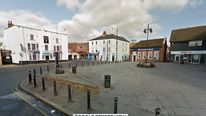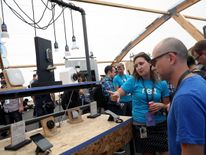Thorne, South Yorkshire, where residents have been told not to drink their tap water.
Thousands of people in South Yorkshire have been warned not to drink their tap water or use it for cooking after high levels of bacteria were found.
Around 3,600 properties in parts of Thorne, near Doncaster, and the neighbouring village of Moorends have been affected by the Do Not Drink warning from Yorkshire Water.
The company said that "following consultation with local health experts" customers should not drink their tap water, cook or prepare food with it, clean their teeth with it or let their pets drink it.
Former Labour leader Ed Miliband, whose constituency covers Moorends, said he was "very concerned" by the situation.
Yorkshire Water said on its website: "Customers in 3,600 properties in the village of Thorne, near Doncaster, have been told not to use their tap water for drinking or cooking.
"High levels of bacteria have been detected in the local water supply, prompting us to issue the precautionary Do Not Drink advice which customers must follow until further notice."
The firm said it was distributing bottled water for residents to use at two locations in Thorne and Moorends.
It said: "Alternative supplies are being proactively delivered to customers on our register of vulnerable customers."
Mr Miliband, the MP for Doncaster North, said on Twitter: "Very concerned for residents who can't drink water because of contamination in parts of Moorends.
"In touch with @YorkshireWater about their provision of water while problem is fixed. Also speaking to council."




